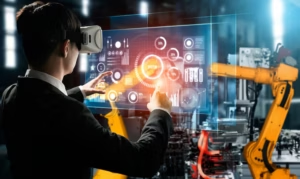
The manufacturing industry has been the pillar of industrial development over the past decades and is poised to undergo a new revolution fueled by artificial intelligence (AI). AI-driven automation is changing the way factories function, with increased efficiency, lower costs, and better product quality. This article explains the vital role of AI in manufacturing automation and uncovers pioneering use cases that are defining the future of the industry.
The Rise of AI in Manufacturing Automation
Automation is not new to business; robots and automated devices have been around for decades. But with AI, you’ve got a different kind of intelligence that you’re putting into these machines, so they can learn, adapt, and improve processes in a way that standard automation can’t. AI software sifts through enormous amounts of data gathered from sensors placed in equipment to make instant decisions and provide predictive analysis.
This shift has allowed manufacturers to move away from rigid, rule-based automation towards more flexible, adaptive systems. AI allows for intelligent factories where machines communicate in harmony, processes are optimized continually, and downtime is minimized.
Predictive Maintenance and Quality Control
Predictive maintenance is one of the key benefits of AI in manufacturing. Instead of relying on fixed schedules or repair on failure, AI systems track equipment health and predict failures ahead of time. Sensors track vibration, temperature, and pressure as examples, providing inputs to AI models that identify signs of wear or failure.
With the knowledge of when a machine component will fail, manufacturers can schedule maintenance ahead of time, eliminating the surprise and cost of breakdowns and plant shutdowns. Predictive maintenance extends equipment life and reduces maintenance costs.
AI also revolutionizes quality control with cutting-edge computer vision. Images and cameras through computer vision inspect products for imperfections at unprecedented levels of accuracy, catching defects that human reviewers will miss. It maintains quality standards and reduces waste.
Rationalizing Workforce Training through AI Video Solutions
Employee training on sophisticated equipment and safety protocols is required, but time-consuming. AI is important once again in this sense by making it simple to produce training material. Companies today can use tools like invideo AI, a cutting-edge AI video generator, to produce instructional and safety videos with ease. Such websites create high-quality videos regularly from simple scripts or text inputs, reducing the requirement for huge production crews.
AI-generated videos offer consistency of training with the additional guarantee that all employees are being provided with the same high-quality training. In addition to speeding up onboarding, this improves both employee safety and competence across various plants and shifts.
Increasing Output with AI-Powered Robotics
AI robots are revolutionizing factory floors. While the older robots travel along established routes, these intelligent robots are able to learn to do tasks, adapt to new products, and collaborate with human workers in a safe environment. This collaborative automation offers greater flexibility in manufacturing so that manufacturers can quickly change between product lines without having to reprogram at a tremendous expense.
These smart machines do repetitive or hazardous work, keeping workplaces safe and enabling human workers to focus on quality control, monitoring, and innovation.
Supply Chain and Inventory Management Optimization
Manufacturing is not just production; there are complex supply chains as well. AI optimizes inventory levels, demand planning, and logistics management for manufacturers. AI algorithms predict future demand with great accuracy based upon historical sales trends, market trends, and external factors such as weather or geopolitical events.
This knowledge minimizes inventory stockouts and overstock, lowers carrying costs, and enhances delivery lead times, rendering manufacturers more competitive.
Conclusion: Embracing AI for a Smarter Future of Manufacturing
The integration of AI into manufacturing automation is unleashing a level of innovation and productivity never seen before. From quality control and predictive maintenance to supply chain management and labor training, AI is enabling manufacturers to reduce costs, enhance product quality, and quickly respond to shifting market demands. These technologies, like an AI video creator, are making training and communication more efficient and streamlined, and intelligent robots and AI-powered analytics are revolutionizing manufacturing and logistics. The further development of AI technology means that AI-adopting manufacturers will be paving the way to smarter, more resilient industrial processes.

